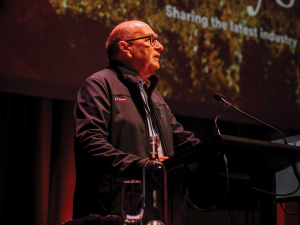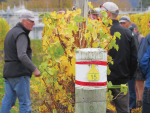Two studies in Marlborough reveal changing the way vines are pruned and treated for trunk disease could save money without impacting quality.
Grape Days attendees in Marlborough, Central Otago and Hawke’s Bay heard from Bragato Research Institute (BRI) Viticulture Field Research and Translation Coordinator Yuichi Ando, who presented the findings of a long-spur pruning trial in three Sauvignon Blanc vineyards, assessing the impact on quality and cost.
A vineyard using the standard four cane pruning method was assessed against one using a four bud-spur vine method and one using a five bud-spur vine method. The study found no difference in disease rates, or the incidence of botrytis or powdery mildew. Both long-spur treatments produced a smaller harvest bunch weight, resulting from lower berry number, but the different pruning methods had no effects on overall yield, wine acidity or volatiles.
There were savings of up to 80c to $1.40 in the long-spur treatments, although that depended on vineyard management, Yuichi said, explaining that cost savings are not expected in the conversion year. The trial also revealed that not all vineyards are suitable for long-spur pruning.
Conversion could take up to two years, and Yuichi’s advice was to not try everything at once. Taking time and using care could improve the longevity of the cordon and prevent additional maintenance costs, he said.
Dr Eline van Zijll de Jong, from Linnaeus Laboratory, presented on the management of grapevine trunk disease through remedial surgery. The surgery – cutting out pieces of the trunk where disease is showing – can be used to help the vine return to health without having to take the whole vine out and replace it, potentially saving costs.
A five year project assessed three vineyards, two in the Hawke’s Bay – one Cabernet Sauvignon and one Merlot - and one organic Sauvignon Blanc vineyard in Marlborough. The results were consistent across all three, she said.
Prevention of infection is vital, and there is no cure. She recommended viticulturists intervene early when trunk disease was detected. Trunk surgery needs to cut as low as possible to eliminate as much of the pathogen as possible. There appeared to be no difference between vines cut in winter and those cut in spring, although spring might be better to avoid frost damage. “It is early days. We need to keep tracking the vines to understand what impact trunk surgery has on vine productivity. There was no effect on wine quality. Some productivity gains were recorded.
Grape Days are a New Zealand Winegrowers and BRI initiative to provide high-level overviews of the latest industry-funded research, with an emphasis on applied science.
Growers spoken to at the Marlborough event said it was a useful and worthwhile session. Whitehaven’s Andrew Holland said it was good to hear what PhD students had found in their research. “Some of the things are anecdotally known in the industry; to have proof behind it is interesting, if nothing else.” Foley Wines’ Kevin Ryan said he looked for something to take away when attending Grape Days. “It makes people think about the long term. You can’t sit on your laurels.”












